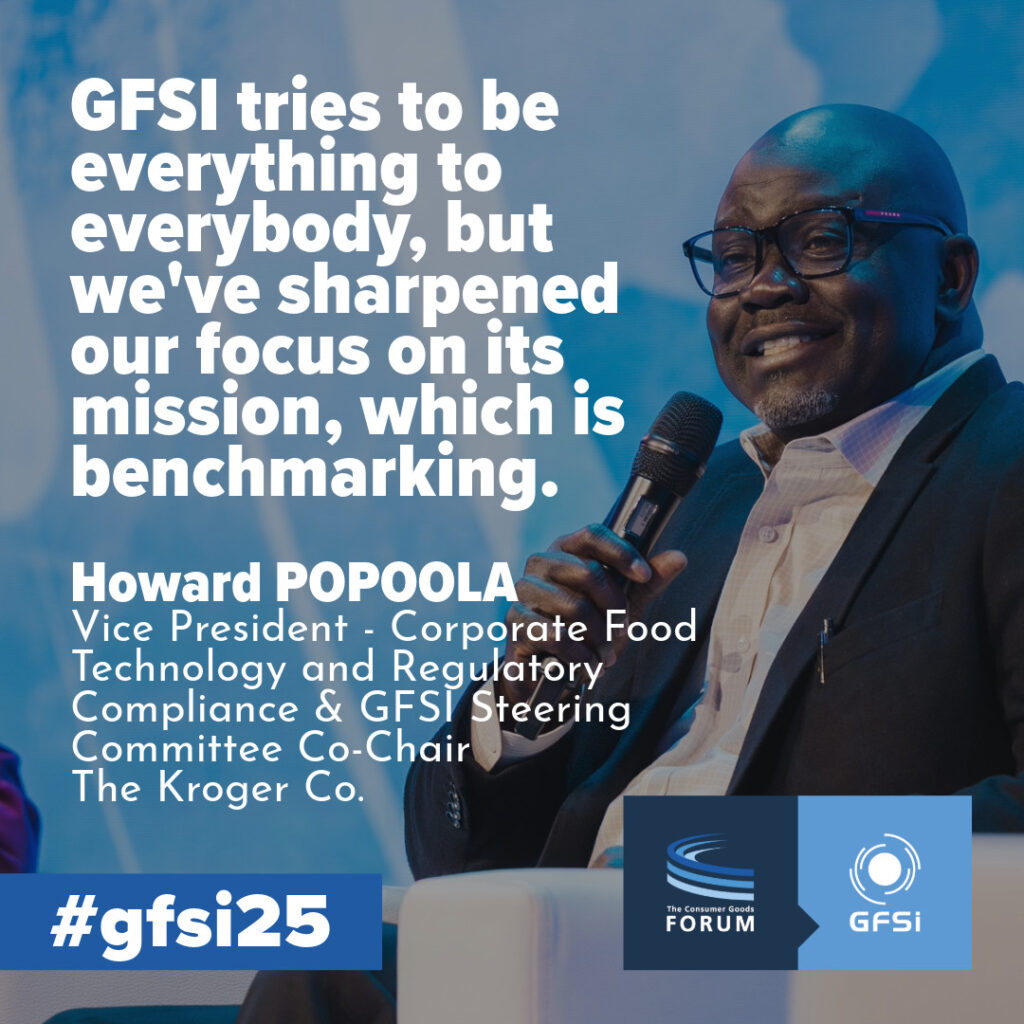DUBLIN, 1ST APRIL 2025: The highly anticipated 2025 GFSI Conference opened today at The Convention Centre Dublin.
“From a retail perspective, it really is at the heart and the core of what we do, providing food safely to our consumers, across all of our networks of stores, wherever we may be in the world.” – Sean Summers, CEO of Pick n Pay
A vibrant and significant morning at the GFSI Conference 2025 has laid the groundwork for crucial discussions on the future of food safety. The sessions highlighted the critical nexus of food safety and sustainability, alongside the transformative potential of new technology application within the food safety ecosystem.
The Role of Trust and Consumer Focus
Sean Summers, CEO of Pick n Pay, powerfully articulated that food safety is a non-compete area, with the consumer being the ultimate priority. Dirk Van de Put, Chairman and CEO of Mondelēz International, emphasised the ongoing need to elevate trust in the food safety system globally, building credibility among food companies, retailers, and governments. Noel Keely, CEO of Musgrave, shared examples of food safety incidents, highlighting the catastrophic impacts food safety failures have on people’s lives and businesses’ sustainability and further demonstrating the critical significance of a robust food safety strategy.
A special session hosted by ECOLAB underscored the profound impact of foodborne illness outbreaks, with a particular focus on, Listeria on consumer trust and emphasised the industry’s collective responsibility to proactively leverage data insights, enhance sanitation practices, and learn from past occurrences to restore and maintain this confidence.
The breakout session, ‘’Cultivating Resilient Food Safety Communities – A Global Perspective’’, explored how community engagement contributes to the broader goals of human, animal and environmental health, particularly in resource-limited settings.
The Core Mission and Vision of GFSI
The Global Food Safety Initiative plays a critical role in ensuring safe food for all. Wai-Chan Chan, Managing Director of The Consumer Goods Forum (CGF), affirmed GFSI’s position as a foundational element of the CGF, with a long-standing commitment to food safety.
GFSI’s Steering Committee has recently convened to re-anchor their work in GFSI’s core mission: “audited once, recognised everywhere.” Key to this mission are the principles of harmonisation, transparency, and trust. Deann Akins-Lewenthal, Senior Director of Global Food Safety and Quality Systems, Mondelēz International specifically noted the importance of harmonising food safety audit standards to ensure a level playing field globally. Mark Fryling, Vice President, Global Food Safety and Quality & GFSI Steering Committee Co-Chair, General Mills further elaborated on the necessity of transparency to foster clarity, enabling better understanding of audit processes and more effective root cause analysis when issues arise.

Collaboration and Stakeholder Engagement
The interconnected nature of the global food system necessitates strong partnerships across the industry. Howard Popoola underlined the significance of the entire food safety ecosystem working together to ensure consumer safety. Dr. Pamela Byrne, former chief executive at the Food Safety Authority of Ireland, provided a compelling overview of the critical importance of collaboration at national, European, and international levels to address complex and evolving food safety challenges.
The Evolving Food Safety Landscape
Dr. Byrne touched upon the multifaceted challenges arising from shifting supply chains, emerging technologies, climate change, and fluctuating consumer expectations. Highlighting Musgrave’s commitment to food safety, Noel Keeley further flagged food fraud and health issues as increased risk factors that food businesses need to address: “We need to bring people back to food”.
The Promise of Organisational Innovation and Emerging Technologies
Lisa Kiribathgoda, Data Solutions Product Lead, MSD Animal Health showcased how technologies like scientific DNA traceability in meat supply chains origin – particularly within the Irish pork sector – enhances transparency, product verification and fosters greater trust throughout the entire value chain. A special session presented Nestle’s journey in implementing a digital HACCP system with Veeva Systems to enhance efficiency, reduce errors associated with manual processes, and improve regulatory compliance through a user-friendly technological approach. With a story based on true events, RENTOKIL put a forensic lens on breakthrough technologies such as AI-driven technology and demonstrate how they are being used to minimise risk and enhance food safety.
During the breakout ‘’Digital Revolution in Food Safety’’, the panel looked at how Whole Genome Sequencing data is revolutionising risk prediction, traceability, and decision-making processes in food safety and examine the ongoing shift towards digital solutions in food safety management.
Strategic Priorities and Initiatives
Dirk Van de Put outlined the “Race to the Top” initiative, the key strategic priorities for GFSI, designed to enhance trust by improving the reliability of audits, emphasising the crucial roles of auditors and Certification Programme Owners (CPOs), and promoting transparency through a planned online database of audit information. The Steering Committee’s recent intensive meetings, as mentioned by Howard Popoola, Deann Akins-Lewenthal, and Mark Fryling, were dedicated to grounding these strategic priorities firmly within GFSI’s core mission and ensuring their effective implementation.
“At Mondelez, we do business in about 160 countries. We obviously try to sell our products in the safest circumstances. It is virtually impossible for us to be personally present in the 30,000 suppliers we deal with. Therefore, we need a seal of trust, and that is what GFSI provides for us.” – Dirk Van de Put, Chairman and CEO of Mondelēz International